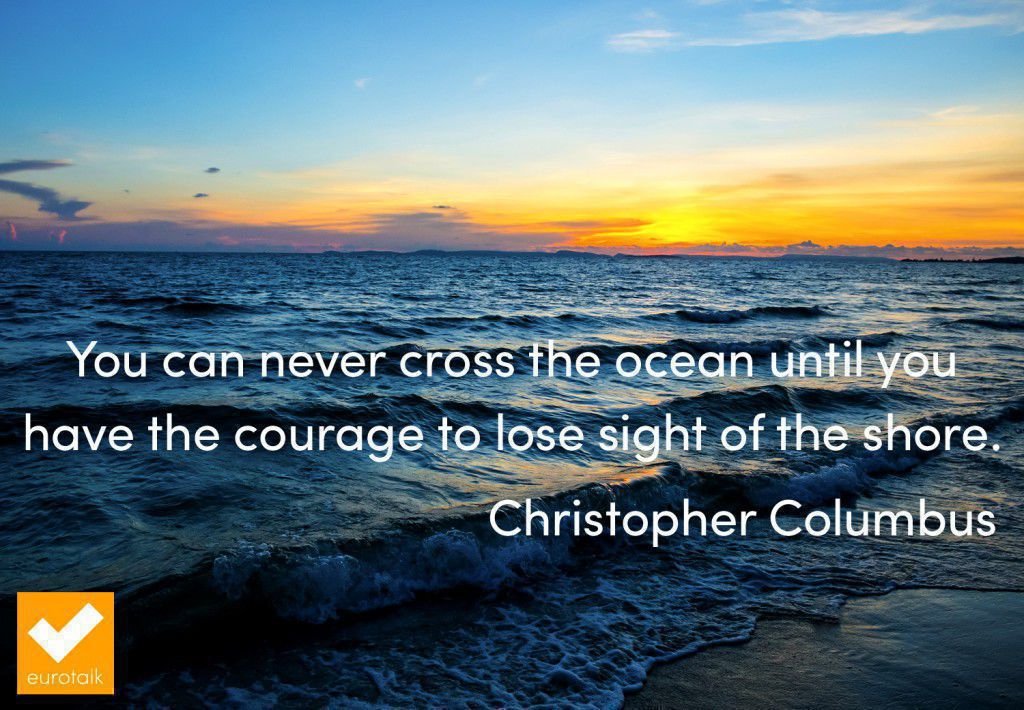Languages of the week: Scotland
This week we’re celebrating Scotland, in honour of the Braemar Gathering of the Scottish Highland Games, which took place this weekend.
 The Braemar Gathering is one of many events that make up the Highland Games from May to September each year. It’s attended by 16,000 people, including members of the Royal Family. Events include tossing the caber, putting the stone, Highland dancing and piping, and competitors must dress in Highland costumes.
The Braemar Gathering is one of many events that make up the Highland Games from May to September each year. It’s attended by 16,000 people, including members of the Royal Family. Events include tossing the caber, putting the stone, Highland dancing and piping, and competitors must dress in Highland costumes.
Scotland has three languages: Scottish Gaelic, Scots and Scottish English – all of which you can now learn with uTalk.
Scottish Gaelic
The Scottish Gaelic alphabet has 18 letters, each of which is named after a tree or shrub.
It’s spoken by 60,000 people, mainly in the Highlands and the Western Isles, but also in Glasgow, Edinburgh and Inverness.
There are also small Gaelic speaking communities in Canada, particularly in Alba Nuadh and on the Cape Breton Islands.
Scottish Gaelic was seen as a declining language, but recently there’s been a real resurgence in schools and an increased presence in the media. The BBC operates a Gaelic language radio station, Radio nan Gàidheal.
Scots
Scots is spoken in the Lowlands and Northern Isles of Scotland. It has four dialects: Insular Scots, Northern Scots, Central Scots and Southern Scots.
A Germanic language variety, Scots is influenced by Gaelic, Norse, Latin, Dutch, Norman French, Standard French and English.
The poet Robert Burns wrote in Scots; a well-known example is Auld Lang Syne, which was written in 1788 and is now traditionally sung at New Year.
So here’s your Challenge of the Week – we want to hear you singing (or reciting, if singing’s not your thing) Auld Lang Syne in the original Scots. If you’re not sure of the words, the BBC website can help. Send us your videos on Twitter to @EuroTalk with hashtag #1788Scots
Scottish English
Also known as SSE (Standard Scottish English), Scottish English dates back to the 17th century, when Scots and English combined.
Although an English speaker can understand Scottish English, the language contains a lot of different words. Some examples are: ‘poke’, which in Scottish English is a container for chips, ‘ken’, which means ‘know’, and ‘aye’, which is the Scottish way of saying ‘yes’.
A few fun facts about Scotland
The national animal of Scotland is the unicorn.
The shortest scheduled flight in the world is from Westray to Papa Westray in the Orkney Islands of Scotland. At just one and a half miles long, it only takes 1 minute 14 seconds.
Scotland’s traditional dish, haggis, consists of the heart, liver and lungs of a sheep boiled in its stomach. It’s tastier than it sounds!
The first recorded sighting of the Loch Ness Monster was in 565 AD, when a ‘water beast attacked one of St Columba’s followers in the loch’.
What’s your favourite Scotland fact?
Learning a language – why bother?
Today, we’re excited to introduce Amy, our new sales and marketing assistant. Amy’s going to be with us for the next twelve months while on her placement year from university, and she’s written today’s blog post, about why learning a language is one of the most important things you can do.
When you ask people if they can speak another language or if they would like to learn one, the response is often, ‘Why? What’s the point, everyone speaks English?’ Here at EuroTalk we want to change this perception and to show you why learning a language can be rewarding, enlightening and open up so many more opportunities.
Yes, it may be easier when visiting another country to assume they will speak English, and very often they do in the main cities and tourist areas, but what if you want to explore off the beaten track and find the soul of a country? Do you want to feel apprehensive, excluded and unable to participate, or do you want to be able to jump in with both feet, get to know local people, their customs and truly the best places to visit and eat, not just the latest Top 10! Without the ability to speak the language it is difficult to get to the heart of a country and to appreciate its people or culture in any depth, you can end up merely skimming a clichéd surface.
If you know the language, you will enjoy meeting people rather than feeling awkward and are likely to make some good friends as well, an even greater benefit if travelling alone. In life, isn’t it as much about the people you meet and the experiences you share, as where you were at the time?
Maybe you’re worried that learning a language is a bit boring? Not any more. With our app, uTalk, you learn in a fun and exciting way, no more sitting at a desk for hours at a time, dreading being asked to read out loud! No time? You can learn on your commute, whilst standing in a queue for your lunch or simply sitting on your sofa at home. Learning a language has never been easier and more accessible. No matter where your next adventure may be, make the most of it by learning the language.  Remember, you never look back and regret the things you did do, just the things you didn’t. So what are you waiting for?
Remember, you never look back and regret the things you did do, just the things you didn’t. So what are you waiting for?
Amy
Quote of the week: 23 Aug 2014
“You can never cross the ocean until you have the courage to lose sight of the shore.” Christopher Columbus
For more like this, find us on Pinterest.
Embed This Image On Your Site (copy code below):
10 reasons to visit… Thailand
Jakub was a junior developer at EuroTalk until recently, and last month he spent a few weeks in Thailand, so we asked him for his tips on what to see and experience in this amazing country. Here are Jakub’s ten reasons to visit Thailand… and if you’ve got anything to add, please write us a comment at the bottom of this post, or tweet us @EuroTalk.
1. Food
Thai food is my personal favourite out of Asian cuisine. A food lover (especially carnivorous) will find himself in a gastronomical paradise once he sets his foot on this land. There are BBQ’d meat stalls every 50-100 metres which offer chicken, pork or liver on a skewer for 10 bahts. The equivalent of 18p. How cool is that. Apart from this you can come across stalls offering rottee (Asian version of pancakes), different kinds of sausages, soups, curries and the all-time classic – pad thai. And if you’re brave enough you can have some deep fried crickets, cockroaches, scorpions and snakes. All made from juicy meat, intense spices and fresh vegetables for less than a quarter of the average UK price.
2. Stunning views
Once you got your plate full of Thai deliciousness you would like to sit down and relax. No worries, dear traveller! You can enjoy gorgeous mountain views in the north (i.e. Doi Suthep near Chiang Mai) or chill out by the beach side in the south (i.e. Ao Nang) or even two combined on one of many islands (such as Koh Tao). Even the cities themselves can offer unique street panoramas (Chiang Mai’s old city).
3. Scuba diving
Thailand is one of the best places on Earth to admire the underwater world. Loved the ocean exploration programmes on travel channels? Well, now you can see everything with your own eyes and within reach of your hand, floating around just like an astronaut in outer space. And it feels like a different world.
4. Moon Parties
Koh Phangan, an island in the south of Thailand, is the host of one of the biggest parties in the country. The biggest one is the Full Moon Party, where you can dance to club music on a beach until sunrise, drinking the famous buckets, and get your body painted with UV reflective paint. Want to go to the jungle? Sure thing! Just keep your eyes peeled and look for the next Half Moon Party, where you can also enjoy dance music topped with fire shows and chilling out on hammocks. There are also less crowded, but still popular Red Moon Parties, Blue Moon Parties, Boat Parties. This island never goes to sleep.
5. Riding a scooter
Scooters and motorcycles play a big part in Asian everyday life – having a scooter is as essential as having a fridge or a washing machine. On top of that you can watch things unseen in Europe, like driving without helmet and shirt, 4-5 people on one scooter, ladies sitting sideways or even dogs balancing in the back! Scooter rental is very popular and, in my opinion, the first thing you should do when coming to a new town. Renting a scooter for a day costs as much as two taxi rides. Beware though – if you haven’t ridden a motorcycle previously, especially in dense traffic, Thailand is not a good place to learn how to drive, even if some rental places will let you without previous experience.
6. Climbing
Krabi is known for its gigantic limestone walls and for that reason it is the Thai capital of rock climbing. Even if you haven’t done this before, don’t worry – there’s a dozen climbing centres offering taster and training sessions. And if you want to spice up your climbs, why not try deep water soloing? If you fall off a wall, you take a dip in the sea and start all over again!
7. Long tail boat ride
Thais know what real recycling is. Apart from the bright, eye-catching colours of their boats there’s one element that stands out – a massive engine taken out from a car and installed on a hinge with a propeller attached to it. You can ask just for a cruise to see magnificent rocks sticking out of the sea or visit a tiny remote island and feel like Robinson Crusoe.
8. Tuk tuk rides
Although tuk tuk drivers will charge you twice or three times as much as a regular taxi, it’s worth the money as a one-off experience. Tuk tuks differ between towns, and the most colourful and distinctive are in Bangkok – motorcycle front with integrated rickshaw-like back is quite comfortable (provided you’re not a 6″3′ bloke) and, if you’re lucky and tip the driver, you might see some wicked tricks on the road (not for the faint-hearted).
9. Thai massage
Yes, I know it sounds cliché, but come on, it’s like being in England and not drinking English tea. One hour-long session and you’ll discover muscles in your body you’ve never used, leaving you crawling out of the place pleasantly relaxed. One thing to bear in mind is to go to such a place during the day with workers wearing uniforms, not by night to a dodgy place with ladies in dresses and high heels.
10. Everything’s cheap
All the things mentioned above have one huge advantage: they’re incredibly cheap. Piles of food for less than 3 pounds, hiring a scooter for as much as a single underground fare, night in a single room for 4 pounds, beer in a bar for a quid and the list goes on. The only real cost is the plane ticket and the rest – you could easily have a month’s trip with a 500 pounds budget. And it’s totally worth it.
Jakub
Thinking of following in Jakub’s footsteps? He found that away from the main tourist areas, knowing a little bit of Thai was really useful. So before you jump on a plane, remember to download uTalk or check out one of our other Thai programs.
How do you choose which language to learn?
Everyone’s always talking about how useful it is to speak another language – and they’re right, for so many reasons. There’s lots of advice too on how to get started and how to stay motivated when it gets tough. But the first question any aspiring language learner should ask themselves is, ‘Which language do I want to learn?’
Sometimes this is easy, because you’re moving to another country, or you’ve met a new partner who speaks a particular language. Even if this means you end up learning a language most people would consider unusual, to you it has a purpose and that makes it anything but obscure.
But what if you’ve just decided you want to learn a language, because you’ve heard that people with a second language earn more, or that learning a language makes you cleverer, and don’t have a particular one in mind?
 At EuroTalk, we offer nearly 140 different world languages. It’s a pretty daunting selection to be greeted with when you’ve just Googled ‘I want to learn a language’ and stumbled on to our homepage, or downloaded the uTalk app. And that doesn’t even come close to the total number of languages spoken in the world. So how is anyone meant to choose one to learn? Do you just close your eyes and point at one?
At EuroTalk, we offer nearly 140 different world languages. It’s a pretty daunting selection to be greeted with when you’ve just Googled ‘I want to learn a language’ and stumbled on to our homepage, or downloaded the uTalk app. And that doesn’t even come close to the total number of languages spoken in the world. So how is anyone meant to choose one to learn? Do you just close your eyes and point at one?
Well no, we don’t recommend that approach; you could end up with something really fun that way, but at the same time, learning a random language just for the sake of it, when there’s very little chance you’ll ever get a chance to speak it, seems a shame. Half the fun of learning a language is getting to share it with other people.
So here are our recommended criteria for choosing a language:
Number of speakers
Generally, a language with more speakers is going to be more useful to you, because you’re going to have more opportunities to speak it. According to Ethnologue, the top five most spoken languages in the world are Chinese, Spanish, English, Hindi and Arabic, with a total of 2.4 billion speakers between them, so knowing one of these languages is going to guarantee you lots of people to talk to.
On the other hand, it depends on your reasons for wanting to learn a language. If it’s to make friends all over the world, one of these five languages will stand you in good stead. But if it’s to improve your employment prospects, bear in mind that you might face more competition if you’ve chosen a popular language. I studied Spanish at university, which is in great demand with employers. But so did lots of other students. We’ve got five people who speak Spanish at EuroTalk – two of them are native speakers (there are less than twenty of us in total, to put that in context) so it’s rare for me to be called on to use my language skills. Something like Portuguese or Japanese, which are still in the top ten in Ethnologue’s list, might offer fewer opportunities but when one comes along, you’re probably not going to face as many rivals for the job.
Where it’s spoken
Another important factor. Firstly, you don’t want to learn a language that’s spoken in a country you never intend to go to, or in which you’ve no interest. Secondly, some languages, like French, Arabic or English, are spoken in many different countries. So if you’re going travelling and want a language you’ll be able to use in more than one place, one of these will be more useful to you. But if travel’s not top of your agenda, this might not be such a big consideration.
Similarity to other languages
Most world languages are organised in families, which means they come from the same root as the other languages in that family. This means often, although you may only speak one language, you can probably at least make yourself understood in another. Hindi and Urdu, for example, are mutually intelligible, as are Czech and Slovak. If you know Spanish, you can make a reasonably decent attempt at Portuguese or Italian, and although you might make a few mistakes, chances are you’ll be understood. I’m not suggesting you should go around speaking the wrong language at people, but if you do make an honest slip-up, or just can’t think of the right word, you’ll probably be ok. I’m fairly sure I spoke quite a bit of Spanish when I was in Italy earlier this year, but everyone seemed to understand what I was getting at.
Some languages, though, don’t have any close neighbours, or indeed any neighbours at all. Basque, for example, is what’s known as a language isolate, as is Korean. This means they don’t belong to a family, but stand alone, so if you’ve chosen one of these languages, it’s worth remembering that it won’t help you with any others.
Your interests
Partly, this is to do with your travel interests. If you’ve a particular interest in Russia, for example, we’d recommend you learn Russian. But even if you’re not particularly interested in travelling, there are other things to consider. Are you a fan of opera? Maybe give Italian a go. Anime? Japanese. Star Trek? Klingon.
Or maybe you’ve got a particular interest in endangered languages, in which case you might want to learn Cornish or Sardinian, not necessarily for the wealth of communication opportunities it offers, but to help save a valuable world language from extinction.
Your commitment
You know yourself better than anyone. How motivated do you feel? Is this just a passing whim that you’re likely to give up the moment it gets difficult, or are you prepared to stick at it? The fact is, some languages are harder than others, and this is different for everyone, depending on your native language. For Europeans, Dutch is considered quite an easy language to learn, while Mandarin Chinese is very difficult. But someone living in Japan may find Chinese much easier to learn than any European language.
So if you’re living in Europe and intending to learn Mandarin, you’ll need to be pretty dedicated. And if you know you don’t have it in you, it might be better to try something else rather than face disappointment when it doesn’t work out. Nobody’s bad at all languages – you just need to find the right one for you.
If you’re still undecided, and in need of some inspiration, take our quiz – it’s not at all scientific, but might give you some ideas!
Or even better, why not try a few out? You can do this for free on our website, or by downloading uTalk for iOS.
If you have any other tips or suggestions for readers trying to choose a language, please share them in the comments.
Liz




